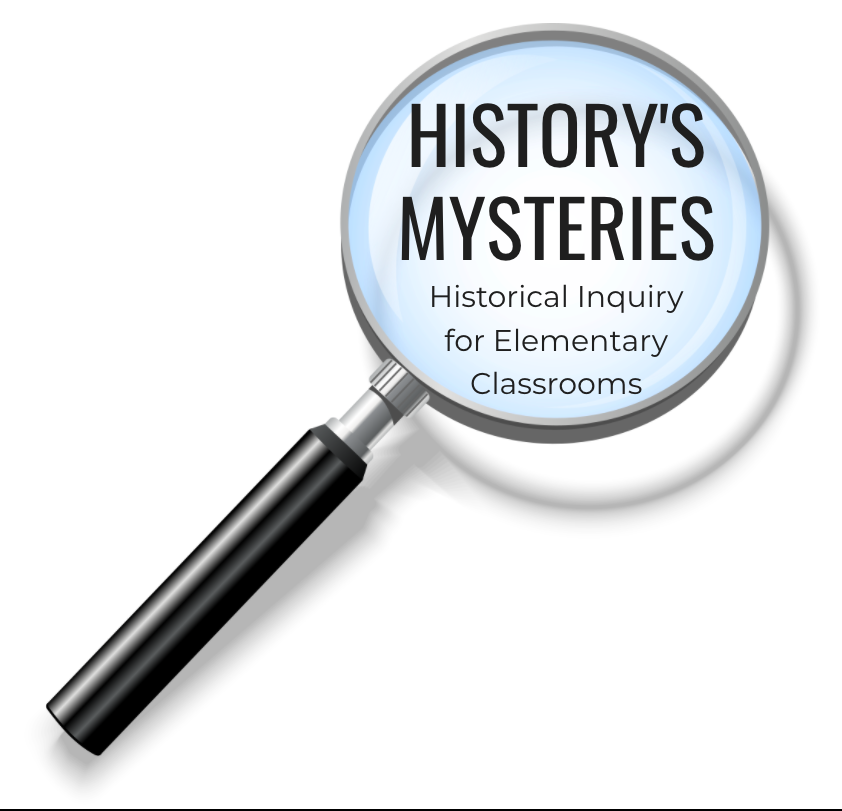December 18, 2020 Update: Newly added to the Kindergarten unit: Mystery #4, HOW DOES A TRADITION BECOME A HOLIDAY? about Juneteenth.
"What has excited my kids most is the chance to be detectives. They look forward to the days of the week when they get to hunt for clues."
-2nd Grade Teacher
November 16, 2020
History's Mysteries has two new mystery-series available to add to the units already available, and teachers are excited. When the History’s Mysteries K-5 inquiry curriculum was introduced, it featured a series of mystery lessons for each grade on a key topic. The adaptable Google slideshows with provided narration, primary sources, and classroom activities turned out to be a bright spot in teachers’ and students’ schedules, and the most frequent single question about the curriculum was, Will there be more History’s Mysteries units?
Creators Laurie Risler and Kelley Brown, full-time teachers who created the curriculum to fill a need articulated by elementary school school teachers for high-quality social studies resources, have been working overtime to develop additional mysteries. With last week’s release of the newest units, shared first on Thursday, November 14 with the teachers who signed up for Teaching History’s Mysteries professional development, there are now two sets of mysteries for Kindergarten, Grade 1, and Grade 5.
Kindergarten teachers now have four new Mysteries that ask, “How Do We Celebrate our Shared Traditions?” Exploring topics of family, community, holidays, and civic engagement, the new Mysteries ask Kindergarten history detectives to find out “Where is the history in a name?” “Why do we have a day off from school?” and “What happens when we want a new holiday?”
First Grade teachers have two sets of Mysteries, too. In the first unit, students explore what it means to belong to a group, what it means to be a citizen, and how groups make decisions. In an additional unit quietly released in September, Risler and Brown followed up with lessons on “What makes a good leader?” Students progress from thinking from school leaders to the Mystery titled “What made people think George Washington would be a good president?” In the third Mystery, “Do good leaders always do good things,” primary sources provide clues that complicate the story of George Washington and frame a discussion about private interests versus the common good.
Reviewers have praised the skillful way that the History’s Mysteries curriculum explores history in a way that honors the agency of all the people. For example, student detectives examine the story of Ona Judge, whose escape from the Washingtons is part of the mystery, “Do good leaders always do good things," and drawing on the prior work on what makes a good leader, notice the qualities of leadership she showed.
For Grade 5, new Mysteries gives student detectives clues about the life of Kossula Cudjo Lewis, who was born free in West Africa, was imprisoned and transported across the Atlantic to be sold as a slave, and whose testimony, given after he gained his freedom is now reshaping how scholars and communities think about the people who faced the conditions of slavery. “How did Kossula Cudjo Lewis and other enslaved people experience the Atlantic World?” provides four new lessons that, like all the others, are fully aligned with the recently updated Massachusetts social studies standards for the grade.
What is most distinctive about the lessons, apart from the teacher-friendly, easy-to-use-and-adapt format, is the way the mysteries lead students to develop skills of exploration and close observation. “Students were engaged with looking for details to solve the mystery. They love noticing details and putting them together to try and figure it out,” described one teacher. Another teacher at the November 14 Teaching History’s Mysteries session commented that after getting practice in “thinking like a history detective” by generating guesses about primary sources, her students were taking more risks in math class to try to understand new problems.
All of the History’s Mysteries curriculum is available to teachers for free. Brown and Risler plan to develop new units for each of the remaining K-5 grades. They expect to announce the release of the next new Mysteries in early 2021.




